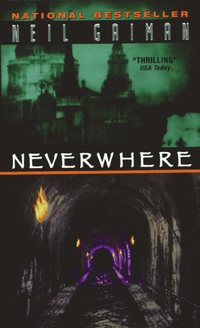
Under våren startades en smärre lokal novellskrivarcirkel. Mitt, tills vidare enda, bidrag till den följer:
Till vägs ände
Det fanns en gång en väg utan ände. Kungen i landet var mycket upprörd eftersom han ansåg att det var emot en vägs natur att sakna ände, och han kunde inte tillåta att sådana onaturligheter skulle kunna finnas i hans kungarike. Därför kallade han samman ett råd av rikets allra visaste män för att finna en lösning på vägproblemet. Efter många, långa och intensiva överläggningar kom rådet fram till att problemet skulle kunna rivas bort. Följaktligen bestämdes det att ett dike skulle grävas tvärs över vägen för att därigenom skapa vägslut där det tidigare inte funnits något.
De kungliga dikesgrävarna skickades till en öde sträcka längs vägen där bara ett fåtal brukade färdas, och där satte de igång sitt arbete. Eftersom de var mycket skickliga grävare så fanns redan vid dagens slut ett präktigt dike tvärs över vägen som inte var passerbart, vare sig till fots eller till häst, på något annat sätt än genom att ta en helt annan väg. Nöjda med sitt dagsverke slog de läger för natten och sov så gott som man bara gör efter att ha åstadkommit något minnesvärt.
När den nya dagen grydde upptäckte grävarna till sin stora förvåning att diket var borta, och därmed också att vägen åter saknade ände. De kunde inte förstå hur deras fina dike bara kunde försvinna över natten utan att någon märkte det. I och med att kungen inte förväntade sig att de skulle komma tillbaka förrän vägproblemet hade lösts fick dikesgrävarna lov att ännu en gång gräva ett dike över vägen. Den här gången grävde de diket dubbelt så brett för säkerhets skull, och på kvällen när det nya diket var färdigt bestämde de sig för att turas om att hålla vakt så att diket inte skulle försvinna igen. Att bevaka ett dike för att se till att det inte försvinner är en ganska tråkig uppgift, framför allt i en sådan öde trakt som de befann sig i där nästan ingen färdades längs vägen, men genom att sitta vakt två och två kunde dikesgrävarna hålla sig vakna under sina vaktpass och se till så att diket inte försvann.
Nöjda med att diket fortfarande fanns kvar packade grävarna ihop sitt läger och sina redskap och började färden tillbaka till det kungliga slottet för att rapportera sina glädjande framsteg, men redan efter några steg, precis när alla hade vänt ryggen mot diket, så hördes ett märkligt djupt suckande ljud från platsen där diket korsade vägen. När de vände sig om såg de att diket hade försvunnit så snart ingen av dem tittade på det. Självklart sjönk humöret hos grävarna när de insåg att allt arbete hittills varit förgäves, men nu kunde de i alla fall göra upp en fungerande plan kring hur man skulle kunna hålla vägen ändlig.
Medan två av dikesgrävarna reste till kungens slott för att rapportera om händelserna och hämta förstärkning stannade de andra kvar för att för tredje gången gräva sönder vägen. Ilskna som de började bli efter att ha arbetat så länge utan något egentligt resultat så blev det nya diket inte särskilt vackert, men det fyllde i alla fall sin funktion som vägförstörare. De såg också till att någon ständigt tittade på diket för att det inte skulle försvinna igen, och på det viset väntade de på att förstärkningen skulle anlända.
I det kungliga slottet beklagade rådet av vise män sig över att det inte hade gått att skapa något permanent slut på vägen genom dikesgrävande. I brist på andra idéer skickade de ut en trupp av två dussin erkänt vaksamma män till diket för att se till att det inte skulle försvinna, men alla insåg att det inte skulle vara en lösning som kunde fungera i längden. Det skulle räcka med att något oväntat hände, kanske en plötslig åskknall eller något liknande, som gjorde att alla vakter tittade bort samtidigt för att diket åter igen skulle försvinna. Därför hölls under flera veckor ett stort antal långa rådslag om nya lösningar på vägproblemet och till slut hade en fungerande plan gjorts upp.
Kungen skickade nu ut landets samtliga dikesgrävare för att gräva diken tvärs över vägen på så många ställen som möjligt. Med riktigt många diken, som samtliga var satta under bevakning, så skulle risken för samtliga vägändar att försvinna vara väldigt liten. Av samma skäl skickades även landets alla murare ut för att oavbrutet bygga nya murar tvärs över vägen liksom landets alla snickare för att oförtrutet låta staket utan grindar korsa vägen. På så vis kunde vägen hållas med ändar i många långa år, och kungen kunde känna sig tillfreds med att ha löst problemet med vägen utan ände.
Tillståndet i landet blev tyvärr allt sämre under dessa år. Kungens fogdar beskattade folket alltmer för att kunna hålla grävare, murare och snickare med materiel och mat. Husen i byarna och i städerna började förfalla eftersom ingen arbetare kunde avvaras till att underhålla byggnaderna. Nästan ingen handel var längre möjlig eftersom inga transporter av varor längre kunde ske längs vägen på grund av alla diken, murar och staket, men det värsta av allt var stanken i städerna eftersom det inte längre fanns någon som kunde se till att hålla avloppsdikena öppna.
På ett barnhem under dessa olyckliga år växte en gosse upp som kallades lilla Jordgubben. Som spädbarn hade han hittats en morgon utanför barnhemmets dörr tillsammans med en lapp som bad barnhemmet att ta hand om honom. Ingen visste därför vilka hans föräldrar var, och i brist på något riktigt namn fick han kallas Jordgubben eftersom han såg ut som en sådan. När barnhemmet tvingades stänga på grund av att bristande underhåll fått taket att rasa in hade han hunnit bli sexton år, så han kunde i alla fall klara sig på egen hand, men de yngre barnen behövde mycket hjälp varje dag för att få mat och för att hitta någon trygg plats att övernatta. Lilla Jordgubben bestämde sig därför för att försöka ordna tillvaron för dem till det bästa och begav sig till kungens slott för att på något sätt se till att bygget av ett nytt barnhem blev av.
Som tur var var det inga problem för Jordgubben att få ett samtal med kungen. Eftersom alla kungens vakter var ute längs vägen och höll koll på diken, murar och staket så fanns det inte längre någon vaktstyrka kvar på slottet som kunde hindra eventuella besökare. Tyvärr vägrade kungen tillåta något nybygge eftersom det skulle öka risken för att vägens ändar skulle försvinna. Nu blev Jordgubben riktigt arg och undrade varför kungen, om det nu var så viktigt att vägen hade ändar, inte gjorde något åt orsaken till att ändarna försvann. Kungen medgav att han inte hade tänkt på det sättet tidigare, men att han inte hade någon möjlighet i det nuvarande ekonomiska läget att göra något åt det. Han visste med andra ord inte vad orsaken var, men eftersom man kunde anta att det låg någon slags magi bakom vägens ändlöshet så gav kungen Jordgubben adressen till den enda trollkunniga kvinnan han kände till och bad honom att undersöka om hon kunde göra något åt saken.
Den trollkunniga kvinnan satt utanför sin stuga och väntade när lilla Jordgubben anlände. Hon skrattade hest och sade att hon hade väntat på honom och att hon mycket väl visste vad det var som stod på, men innan hon berättade mer krävde hon att Jordgubben skulle utföra några ärenden åt henne. Det första ärendet var att plocka lite irrtryffel.
Irrtryffel var en svamp som levde under jorden och enbart växte på en enda plats i en liten skog en halv dags vandring bort från gummans stuga. Egentligen borde irrtryffeln vara ganska enkel att hitta eftersom man fick hjälp av de tre sångälvorna i den lilla skogen, men deras hjälp var ganska svår att utnyttja i praktiken och därför hade ingen i mannaminne hittat svampen. Platsen den växte på var den plats där sången från de tre sångälvorna skulle ha hörts lika starkt om de sjöng samtidigt. Eftersom sångälvor är skygga väsen så sjöng de inte om någon befann sig närmare dem än hundra steg, och dessutom såg irrtryffeln till att all sång dämpades inom hundra steg från dess växtplats. Det var i alla fall vad Jordgubben kunde erinra sig från vad kvinnan hade sagt, men han var inte säker på att han mindes instruktionerna korrekt.
Jordgubben gick in i skogen och fick till slut höra den undersköna sångälvesången med dess komplicerade melodi och vackra harmonier, och han försökte lista ut hur han skulle hitta irrtryffeln. När han kom till en rotvälta tystnade plötsligt all sång, och han tänkte att tre tystnader är lika starka som en, så han började gräva på platsen där han stod. En halv meter ned i jorden hittade han något växande som såg ut som en rödbrun knytnäve vilket han antog var en irrtryffel. Han stoppade den i sin ränsel och vandrade tillbaka med den till trollkvinnan. Hon var mycket tacksam, för det var mycket riktigt en mogen irrtryffel han hade plockat, men även en smula förvånad att han hade förstått hennes instruktioner. Hennes nästa ärende var att låta Jordgubben lära björnen att fiska utan nät.
Vid en bäck mitt i storskogen levde björnen. Björnen hade en gång för länge sedan hittat ett fiskenät och genom att prova sig fram lärt sig hur man bäst kunde använda det för att fånga fisk att äta. Genom åren hade nätet blivit allt mer slitet och fiskfångsten blev allt sämre, och i och med att björnen inte kunde reparera nätet med sina stora klumpiga ramar så blev den allt hungrigare och ledsnare med tiden. När Jordgubben hittade björnen satt den och grät med ett helt söndertrasat fiskenät på marken framför sig. Jordgubben försökte trösta björnen men i och med att björnar och människor inte talar samma språk var björnen otröstlig, så istället fick han lov att visa hur andra björnar brukar fånga fisk. Genom att stå i bäcken och vänta tålmodigt kunde Jordgubben efter hand få tag i några fiskar genom att slå dem när de simmade förbi. Björnen tittade intresserat på, och när den så småningom förstod principerna bakom den traditionella fiskemetoden kunde den på egen hand gå ut i bäcken och fånga fisk. Nöjd med vad han uträttat tog Jordgubben farväl av björnen, plockade på sig det trasiga nätet och vandrade tillbaka till trollkvinnan. Hon blev glad eftersom det var hennes gamla nät som nu äntligen kommit till rätta. Det tredje ärendet hon ville att Jordgubben skulle uträtta var att baka en kaka.
Kakan skulle bakas av riksrågmjöl. Riksrågen var det utsäde som landets alla bönder använde till sina åkrar, så om man gjorde mjöl av utsädet så skulle bönderna inte kunna så någonting alls nästa år. Jordgubben blev riktigt arg och talade om för trollkvinnan att han vägrade förstöra landets folks framtida bröd bara för att baka en kaka till henne. Hon svarade med ett glatt skrockande att det är bra att inte bara göra vad man blir tillsagd utan man ska alltid istället försöka se till allas bästa. Hon förklarade vidare att det var hon som låg bakom att vägen saknade ände. Det var för att tydligt visa upp hur dåliga kungen och hans män var för landet som hon hade förtrollat vägen till att sakna ände. Eftersom den oändliga vägen ledde överallt i landet, till skillnad från kungens vägar som bara ledde mellan hans olika slott, hade hon tänkt att folket i landet skulle börja använda vägen till att resa mellan landsändarna och lära sig mer om varandra. Tyvärr hade kungens vägförstörarplaner satt käppar i hjulet på hennes plan så hon hade dragit sig tillbaka i bitterhet i stället. Nu när landet var nära sitt totala sammanbrott hade hon till slut kommit på bättre tankar.
Trollkvinnan och lilla Jordgubben reste tillsammans till kungens slott. Väl där kunde de förklara hela situationen för honom. Kungen insåg nu själv att han hade varit en riktigt dålig regent och föreslog att lilla Jordgubben skulle ta över efter honom på tronen. Det ville inte Jordgubben. Han undrade om det var nödvändigt för landet att absolut ha en kung när det enda folket egentligen vill är att få vara ifred och känna sig trygga. Det beslutades därför att landet styrelseskick i grunden skulle göras om så att folket kunde se till att deras skatter gick till goda ting. Alla aktiviteter kring att avsluta vägen upphörde och Jordgubben kunde till sist se barnhemmet byggas upp på nytt. Tyvärr började nu småkungar härja runt om i landet när gamla storkungens makt försvann, men det är en annan historia. Tills vidare levde hela landet i lycka.




